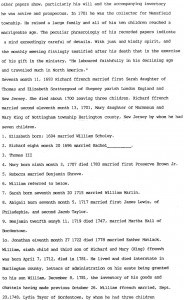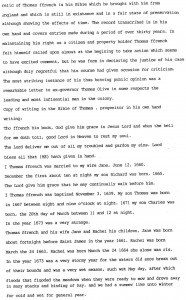F887ba
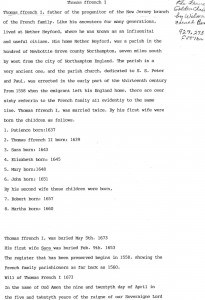
Thomas French was married twice. Children with his first wife:
- Patience born 1637
- Thomas II born 1639
- Sara born 1643
- Elizabeth born 1645
- Mary born 1648
- John born 1651
By second wife:
7. Robert born 1657
8. Martha born 1660
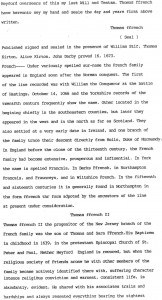
The French family appeared in England soon after the Norman conquest. The first of the line recorded was with William the Conqueror at the battle of Hastings, October 14, 1066 and the Yorkshire records of the twentfth century frequently show the name. Other located in the begining chiefly in the southeastern counties, but later they appeared in the west and in the north as far as Scotland. They also settled at a very early date in Ireland, and one branch of the family trace their descent directly from Rolio, Duke of Normandy. In England before the close of the thirteenth century, the French family had become extensive, prospersou and influential. In York the name is spelled Francnis, In Berks Ffrensh, in Northampton Francais and Fraunceys and in Wiltshire French. In the fifteenth and sixteenth centuries it is generally found in Northampton in the form ffrench thr form adopted by the ancestors of the line at present under consideration.
Thomas French II the progenitor of the New Jersey branch of the French family was the son of Thomas and Sara French. His baptism in childhood in 1639, in the protestant Episcopal Church of St. Peter and Paul, Nether Heyford England is recorded, but when the religious society of Friends arose he with other members of the family became actively identified there with, suffering character intence religious conviction and earnest, consistent life, is abundantly, evident. He shared with is associates trails and hardships and always resented everything bearing the sightest resemblance to injustice or oppression. The most vigorous efforts were made to suppress the Society of Friends. Their meeting was outlawed, their property unjustly taken through fines and imposition of tithes, and great numbers were thrown into prison.
Thomas French of upper Norton was imprisoned. In 1657, at suit of William Thomas, a lawyer and a renter of Tithes, and for a demind of but eleven shilling for tithes. Suffered two and fourty months imprisonment. — Vol. 1 page 564. Sufferings of the people called Quakers
Thomas French was among the first to take practical interest in the colonization of friends of America. On the third of March 1676 about one hundred fifty earnest minded men, including William Penn, Gauen Lauris, Thomas Lambet, Thomas Olive, Thomas Ffrench, Edward Byllynge and Henry Stacy, signed a paper entitled “The concessions and agreement of the proprietors, freeholder and inhabitant of the Prodvince of West New Jersey in America.
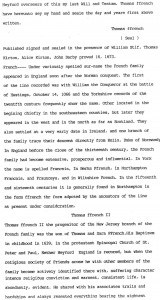
Thomas ffrench has left account of the coming of himself and family. Three years after the arrival of the pioneer colonists. He said from London, in the ship Kent, Gregory Mallowee master the same vessel which brought the first company of settlers in 1677 to Burlington — about the first of August 1680 with his wife and nine children, four sons and five daughters the oldest child being 16, while the youngest was not yet four years of age.
He settled upon a tract of 600 acres of desirable land, located along the banks of the Rancocas, about four miles from Burlington.
Thomas ffrench’s home in Nether Heyford, was a parish in the hundred of Newbottle Grove county Northampton, seven miles south by west from the city of Northampton, England. The parish is a very ancient one and the parish church dedicated to S.S. Peter and Paul, was erected in the early part of the thirteenth century. From 1558 when the register begins down to 1680 when he emigrant left his English home, there over sixty references to the French Family all evidently referring to the same line.
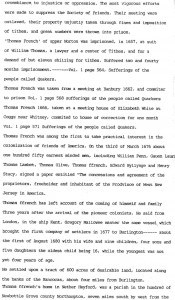
Thomas Ffrench II born October 1639
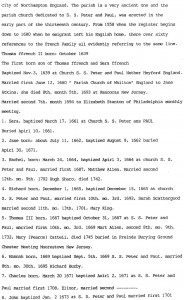
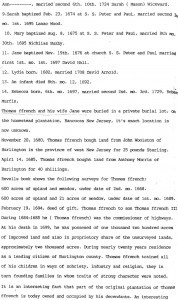
page 6 – November 20, 1680, Thomas French bought land from John Woolston of Burlington in the province of west New Jersey for 25 pounds Sterling. April 14, 1685, Thomas Ffrench bought land from Anthony Morris of Burlington for 40 shillings.
Revells book shows the following surveys for Thomas Ffrench:
600 acres of upland and meadow, under date of 2nd. mo. 1668.
600 acres of upland and 21 acres of meadow, under date of 1st mo. 1689.
February 19, 1694, deed of gift, Thomas Ffrench to son Thomas Ffrench . During 1684-1685 he (Thomas Ffrench) was the commissioner of highways. At his death in 1699, he was possessed of one thousand two hundred acres of improved land and also in proprietary share of the unsurveyed lands, approximately two thousand acres. During nearly twenty years residence as a leading citizen of Burlington county. Thomas Ffrench trained all of his children in ways of sobriety, industry and religion, they in turn founding families in whom traits of strong character were noted.
It is an interesting fact that part of the original plantation of Thomas Ffrench is today owned and occupied by his descendants. An interesting relic of Thomas Ffrench is his Bible which he brought with him from England and which is still in existence and in a fair state of preservation although showing the effect of time. The record transcribed is in his own hand and covers entries made during a period of over thirty years. In maintaining his right as a citizen and property holder Thomas Ffrench felt himself called upon almost at the beginning to take action which seems to have excited comment, but he was form in declaring the justice of his case although duly regretful that his course had given occasion for criticism. The most striking instance of his thus braving public opinion was a remarkable letter to ex-governor Thomas Olive in some respects the leading and most influential man in the colony.
Copy of writing in the Bible of Thomas, progenitor in his own hand writing:
Tho Ffrench his book, God give him grace in Jesus Lord and when the bell for me doth toll, good Lord in Heaven to rest my soul.
The Lord deliver me out of all m troubled and pardon m sins. Lord bless all that (HE) hath given in hand.
I Thomas Ffrench was married to my wife Jane, June 12, 1660. December the first about ten at night my son Richard was born, 1665. The Lord give him grace that he may continually walk before him.
I Thomas Ffrench was baptized November 3, 1639. My son Thomas was born in 1667 between eight and nine o’clock at night. 1672 my son Charles was born, the 20th day of March between 11 and 12 at night.
In the year 1673 was a very strange.
Thomas Ffrench and his wife Jane and Rachel his children, Jane was born about fortnight before Saint James in the year 1661. Rachel was born March the 24, 1663. Rachel was born March the 24, 1664 she alone was ris.
In the year 1673 was a very stormy year for the waters did sore break out of their bounds and was a very wet season, such wet May day, after which floods that flooded the meadows when they were ready to mow and drove away in man stacks and binding of hay, and we had summer like unto winter for cold and wet for general year.
I and my wife and nine children through the great mercy of God came into this country and landed at Burlington, the 23 of the 7 month 1680.
Thomas Ffrench
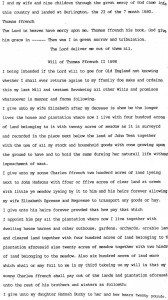
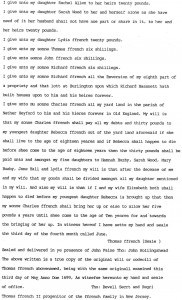
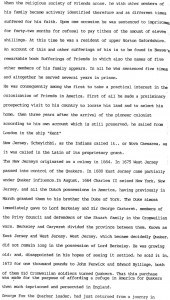
When the religious society of Friends arose. He with other members of his family became actively identified therefore and at different times suffered for his faith. Upon one occasion he was sentenced to imprisonment for forty-two months for refusal to pay tithes of the amount of eleven shillings. At this time he was a resident of upper Norton Oxfordshire. An account of this and other sufferings of his is to be found in Besse’s remarkable book Sufferings of Friends in which also the names of five other members of his family appears. In all he was sentenced five times and altogether he served several years in prison.
He was consequently among the first to take a practical interest in the colonization of Friends in America. First of all he made a preliminary prospecting visit to his country to locate his land and to select his home, then three years after the arrival of the pioneer colonist according to his own account which is still preserved, he sailed from London in the ship “Kent”
New Jersey, Scheyichbi, as the Indians called it. or Nova Caesarea, as it was called in the Latin of its propietary grant.
The New Jerseys originated as a colony in 1664. In 1675 West Jersey passed into control of the Quakers. In 1680 East Jersey came partially under Quaker influence. In August, 1664 Charles II seized New York, New Jersey, and all the Dutch possessions in America, having previously in March granted them to his brother the Duke of York. The DUke almost immediately gave to Lord Berkeley and Sir George Carteret, members of the Privy Council and defenders o the Stuart family in the Cromwellian wars. Berkeley and Caryeret divided the province between them. Known as East Jersey and West Jersey, West Jersey, which became decidedly Quaker did not remain long in the possession of Lord Berkeley. He was growing old: and, disappointed in his hopes of seeing it settled, he sold it in, 1673 for one thousand pounds to John Fenwick and Edward Byllinge, both of them old Cromwellian soldiers tuned Quakers. That his purchase was made for the purpose of affording a refuge in America for Quakers then much imprisoned and persecuted in England.
George Fox the Quaker leader, had just returned from a journey in America, in the course of which he had traveled through New Jersey in going from New York to Maryland. Some years previously in England, about 1659 he had made inquiries as to a suitable place for Quakers settlement and was told of the region north of Maryland which became Pennsylvania. But how could a persecuted sect obtain such a region from the British Crown and Government that was persecuting them? It would require powerful influence at Court: nothing could then be done about it; and Pennsylvania had to wait until William Penn became a man with influence enough in 1681 to win it from the Crown. But here was West Jersey no longer owned directly by the crown and bought in cheap by two Quakers. It was an unexpected opportunity. Quakers soon went to it, and it was the first Quaker colonial experiment.
Byllinge and Fenwick, though turned Quakers, seem to have retained some of the contentious Cromwellian spirit of their youth. They soon quarreled over their respective interests in the ownership of West Jersey; and to prevent a lawsuit, so objectionable to Quakers, the decision was left to William Penn. They conveyed this lease and their claims to Penn, Lawrie and Lucas who thus became the owners, as trustees of pretty much all West Jersey. Sir William Jones deciding against them, he acquiesced confirmed the political rights of West Jersey by a separate grant, and withdrew any authority Andros claimed over East Jersey, The trouble however did not end here. Both the Jerseys were long afflicted by domineering attemplts from New York.
Penn and his fellow trustees now prepared a constitution, or concession and Agreements, as they called it, for West Jersey, the first Quaker political constitution embodying their advanced ideas, eastablishing religious liberty, universal suffrage, and voting by ballot, and abolishing imprisonment for debt. It foreshadowed some of the ideas subsequently included in the Pennsylvania constitution.
Other Quaker immigrants followed, going to Salem as to Burlington and a stretch of some fifty miles of the river shore became straongly Quaker. There are not many American towns now to be found with more of the old-time picturesquesness and more relics of the past than Salem and Burlington.
Burlington was made the capital of West Jersey, a legislature was convened and laws were passed under the “concessions” or constitution of the proprietors. Salem and Burlington became ports of the little province, which was well under way by 1682, when Penn came out to take possession of Pennsylvania.
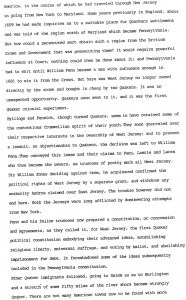
This is a brief history of some of the children . . .
